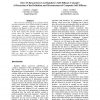Free Online Productivity Tools
i2Speak
i2Symbol
i2OCR
iTex2Img
iWeb2Print
iWeb2Shot
i2Type
iPdf2Split
iPdf2Merge
i2Bopomofo
i2Arabic
i2Style
i2Image
i2PDF
iLatex2Rtf
Sci2ools
114
click to vote
HICSS
2011
IEEE
2011
IEEE
Have IS Researchers Lost Bandura's Self-Efficacy Concept? A Discussion of the Definition and Measurement of Computer Self-Effica
There has been something of an academic debate between proponents of two different kinds of computer self-efficacy: general computer self-efficacy ala Compeau and Higgins on the one hand, and specific computer self-efficacy ala Marakas et al. on the other. It has been argued that specific self-efficacy more clearly shows the impact of treatments and more clearly shows the impact on performance. Here we argue that these two constructs (as measured) are two very different constructs, one deriving from Bandura’s definition and conceptualization of self-efficacy, and the other deriving from Gist and co-authors’ definition and conceptualization of self-efficacy. We argue that though the IS research field seems to be moving in the direction of specific computer self-efficacy, general computer self-efficacy is quite different and quite important. Further, we argue that using the same label for these two different constructs invites misunderstanding and even misdirection.
| Added | 20 Aug 2011 |
| Updated | 20 Aug 2011 |
| Type | Journal |
| Year | 2011 |
| Where | HICSS |
| Authors | Jennifer L. Claggett, Dale Goodhue |
Comments (0)

